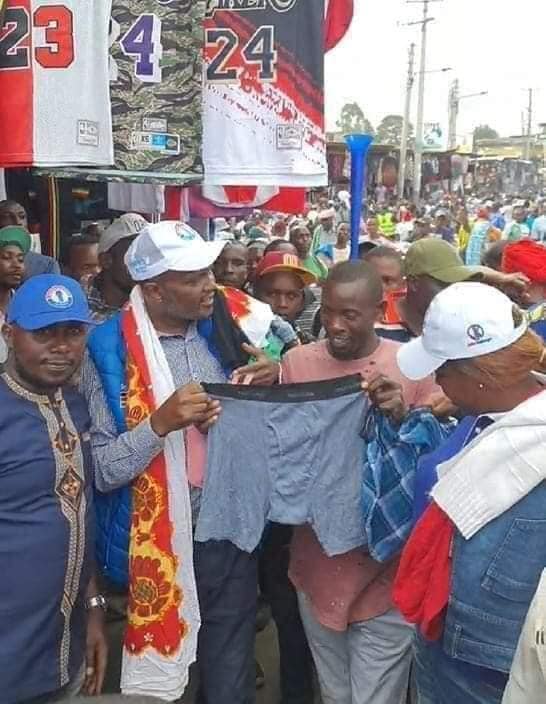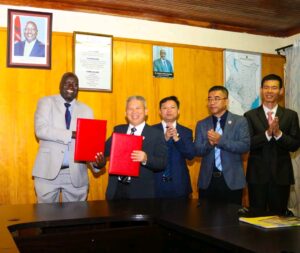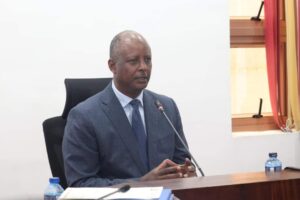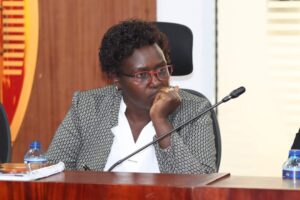Kuria: We’ll ban mitumba once we find an alternative


CS Kuria pointed out that Kenya exports locally made fabric at a cheaper price than it imports the second-hand clothes.
He said his ministry is focused on empowering the local textile industry.
Investments, Trade and Industry Cabinet Secretary Moses Kuria says the government will ban the importation iof second-hand clothes, commonly known as ‘mitumba’, once they find an alternative from the local textile industry.
Kuria while speaking at the Chamngamka Shoping Festival in Nairobi on Tuesday pointed out that Kenya exports locally made fabric at a cheaper price than it imports the second-hand clothes.
He said his ministry is focused on empowering the local textile industry.
“Whatever is required for us to sell to our people the same way we are selling to America, we will do. Once the option is available we will do like South Africa. South Africa banned mitumba. I’m sure you want me to say that we are going to ban mitumba, Yes, we will ban mitumba once we give people an alternative and then we ban it,” said Kuria.
“The price we are selling to America is much lower than Mitumba. It’s not a question of price, it’s a question of availability, and it’s a question of information. I will work with the textile industry and make sure that first we make the cheaper clothes available in this market,” added the CS who took over the docket from Betty Maina last week.
Kenya is one of the largest importers of second-hand clothes in Sub-Saharan Africa and while the idea of banning used apparel may be sound, it always turns out to be a hot button issue.
During campaigns in the lead-up to the August General Election, President William Ruto and his main rival, Raila Odinga, locked horns over each other’s comments on imported second-hand clothing.
Odinga in his presidential manifesto blamed the country’s low-performing textile industry on an influx in mitumba, while Ruto tore into the idea, saying the former premier’s vision for the country’s textile industry will negatively affect the second-hand clothing business.
“Trickle down is dangerous. They branded business people’s merchandise counterfeit & destroyed them. Now clothing enterprises are dealers in dead-people’s wares to be banned. BOTTOM UP, using TVET will assist these enterprises grow from sewing, cottage to textile & leather industry,” said DP Ruto.
In response to the then-Deputy President’s utterances, Odinga posted a video capturing him at a past political rally in which he likewise stated that should he clinch the presidency, his government will ban importation of mitumba and endorse the roll out of locally manufactured products.
“Mambo ya viti tunaagiza, nguo tunaagiza, viatu tunaagiza; tutasimamisha ndio hiyo nguo na viatu na all wooden products zitengenezwe nchini ili tuweze kuondoa umaskini na kuajirii vijana wetu wote,” Ruto says in the video.
But amid the contention, some experts have argued that phasing out second-hand clothes to promote the manufacture and consumption of Kenyan-made clothes does not necessarily mean that domestic industries will thrive.
Institute of Economic Affairs (IEA) CEO Kwame Owino in June said they had established that Kenyans do not use mitumba as an alternative to new clothes.
Mr. Owino faulted the plan as one that stifles the freedom of Kenyans, adding the multi-billion-shilling industry has its own value chain and should be allowed to co-exist with the local textile sector.
“The government should try to foster the domestic cotton industry, but that should not be done by telling people that you will choose what they wear. Allow Kenyans to make the decision,” he stated in an interview with Citizen TV.
He termed such a move as “making unnecessary damage to other people’s jobs just because you have decided what people should wear.”
According to the Kenya Bureau of Statistics (KEBS), Kenya imported 184,555 tonnes of second-hand clothing valued at Ksh. 17.8 billion in 2019.
The mitumba industry, KEBS also said, has also been the breadbasket for about 2 million Kenyans.
According to a 2019 survey by IEA and the Mitumba Consortium Association of Kenya, 91.5% of households buy second-hand clothes worth Ksh.1000 and below.
While the collapse of the local textile industry has translated to huge revenue losses, the mitumba industry also does generate a lot of money for the State.
The study found out that the mitumba industry’s import taxes added up to $15,000 (Ksh.1.7 million) per 40ft container (equivalent to 24 tonnes).
“Kenya imported 185,000 tonnes of second-hand clothing in 2019, equivalent to an approximate 8,000 containers,” the report said.
Courtesy Dennis Musau of Citizen Digital
Courtesy Dennis Musau of Citizen Digital





